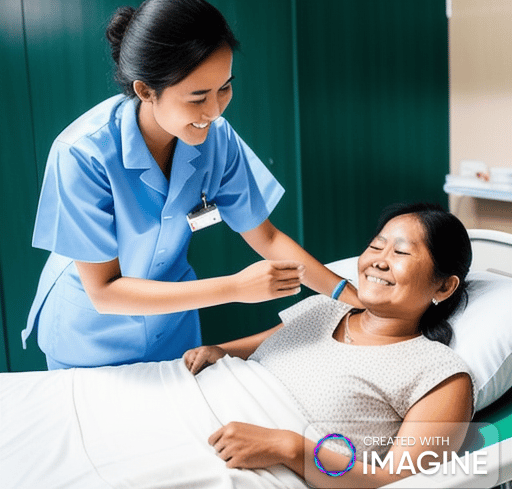WELCOME TO 1 ACHIEVE MAID AGENCY SINGAPORE I MAID AGENCY SG
Health and Safety Considerations for Your Domestic Helpers in Singapore
This blog post provides a comprehensive guide on ensuring the health and safety of your domestic helper, detailing mandatory medical check-ups, health insurance, and additional tips for maintaining her well-being.
ESSENTIAL KNOWLEDGE
Bryan
8/17/20247 min read
Ensuring the Health and Safety of Your Domestic Helper
1. Creating a Safe Working Environment
Home Safety
Creating a safe working environment begins with assessing your home for potential hazards and making necessary adjustments. Here are some key considerations:
1.1. Securing Heavy Furniture
Heavy furniture should be securely anchored to the wall to prevent tipping. This is especially important if your helper is responsible for cleaning or arranging furniture. For example, bookshelves, dressers, and cabinets should be fixed to the wall using appropriate safety brackets or anchors.
1.2. Electrical Safety
Ensure that electrical outlets are safe and up to code. Check for exposed wires, faulty outlets, or damaged cords. Make sure that appliances are in good working condition and that your helper knows how to use them safely. It’s also wise to have a professional electrician inspect your home periodically.
1.3. Slips, Trips, and Falls
Minimize slip and trip hazards by keeping floors clear of clutter and using non-slip mats in wet areas such as the kitchen and bathroom. Ensure that all rugs are secured to the floor to prevent tripping. Install handrails in stairways and provide adequate lighting throughout your home.
Kitchen Safety
The kitchen is often the most hazardous area in a home due to the use of sharp utensils and hot surfaces. Here's how to ensure safety:
1.4. Safe Cooking Practices
Train your helper in safe cooking practices. This includes using knives properly, handling hot pots and pans, and understanding how to operate kitchen appliances safely. Regularly inspect kitchen tools and appliances to ensure they are in good working order.
1.5. Fire Safety
Ensure that your kitchen is equipped with a fire extinguisher and that your helper knows how to use it. Teach her how to manage kitchen fires, such as those caused by cooking oil. Regularly check smoke detectors and ensure they are functioning properly.
1.6. Proper Food Handling
Proper food handling is crucial for preventing foodborne illnesses. Ensure your helper is trained in hygiene practices such as washing hands before cooking, avoiding cross-contamination, and storing food at appropriate temperatures. This includes using separate cutting boards for raw meat and vegetables.
Chemical Safety
Domestic helpers often handle cleaning agents that can be harmful if not used properly. To ensure safety:
1.7. Safe Use of Cleaning Products
Provide your helper with training on the safe use of cleaning chemicals. This includes reading labels, following instructions, and using appropriate personal protective equipment (PPE) such as gloves and masks. Store chemicals in a secure place, out of reach of children and pets.
1.8. Ventilation
Ensure that cleaning products are used in well-ventilated areas to reduce the risk of inhaling harmful fumes. If possible, use environmentally friendly or non-toxic cleaning products to minimize health risks.
2. Health and Hygiene Practices
Personal Hygiene
Good personal hygiene is essential for maintaining health and preventing the spread of diseases:
2.1. Access to Hygiene Products
Ensure your helper has access to necessary hygiene products such as soap, hand sanitizers, and personal care items. This includes providing access to clean and well-maintained bathroom facilities.
2.2. Hand Hygiene
Encourage your helper to practice regular handwashing, especially before handling food and after using the bathroom. Provide information on proper handwashing techniques and ensure that handwashing facilities are readily available.
Food Safety
Food safety practices are crucial for preventing illnesses and ensuring a healthy environment:
2.3. Training in Food Safety
Train your helper in proper food handling techniques, including washing fruits and vegetables, storing food correctly, and cooking to safe temperatures. This training should cover aspects such as avoiding cross-contamination and understanding expiration dates.
2.4. Safe Storage Practices
Ensure that your helper understands safe food storage practices, such as keeping perishable items in the refrigerator or freezer and using airtight containers for dry goods. This helps prevent spoilage and reduces the risk of foodborne illnesses.
Cleanliness and Sanitation
Maintaining a clean and sanitary environment is key to health and safety:
2.5. Cleaning Routines
Establish a cleaning routine that includes regular cleaning of high-touch surfaces such as doorknobs, light switches, and countertops. Provide your helper with a checklist of tasks to ensure consistency in cleaning practices.
2.6. Disinfection Procedures
Implement disinfection procedures for areas prone to germs and bacteria, such as bathrooms and kitchens. Use appropriate disinfectants and ensure that your helper is trained in their proper use.
3. Emergency Preparedness
First Aid Training
Basic first aid knowledge is essential for handling emergencies:
3.1. Enroll in First Aid Courses
Consider enrolling your helper in a first aid course where she can learn essential skills such as CPR, treating burns, and managing minor injuries. This training can be beneficial in emergencies and enhances her ability to respond effectively.
3.2. First Aid Kit
Maintain a well-stocked first aid kit in your home, including items such as bandages, antiseptic wipes, and burn ointments. Ensure that your helper knows where the kit is located and how to use its contents.
Emergency Contacts
Having a list of emergency contacts is crucial for quick response:
3.3. Contact Information
Provide your helper with a list of emergency contacts, including family members, neighbors, and local emergency services. Ensure she knows how to reach these contacts quickly in case of an emergency.
3.4. Emergency Procedures
Explain the procedures for various emergency scenarios, such as fires, medical emergencies, or natural disasters. Conduct regular drills to ensure your helper is familiar with these procedures and knows how to act in different situations.
Fire Safety
Fire safety is an essential aspect of emergency preparedness:
3.5. Fire Drills
Conduct regular fire drills to ensure that your helper knows the evacuation routes and procedures. Review fire safety protocols, such as how to use a fire extinguisher and how to alert others in case of a fire.
3.6. Fire Safety Equipment
Ensure that your home is equipped with functioning smoke detectors, fire alarms, and fire extinguishers. Regularly check these devices to ensure they are in working order and replace batteries as needed.
Mandatory Medical Check-ups and Health Insurance
1. Mandatory Medical Check-ups
Pre-Employment Medical Examination
A pre-employment medical examination is a requirement for hiring domestic helpers in Singapore:
1.1. Examination Requirements
Before employment, your helper must undergo a pre-employment medical examination. This examination includes tests for infectious diseases such as tuberculosis (TB), HIV, and other communicable diseases. The purpose is to ensure that she is fit for work and does not pose a health risk to others.
1.2. Choosing a Medical Facility
Select a reputable medical facility or clinic for the examination. Ensure that the clinic is approved by the Ministry of Manpower (MOM) and that the results are submitted according to MOM guidelines.
Six-Monthly Medical Examination (6ME)
Domestic helpers must undergo a medical examination every six months:
1.3. Purpose of 6ME
The six-monthly medical examination (6ME) is mandatory for all domestic helpers in Singapore. It checks for pregnancy and infectious diseases such as tuberculosis and syphilis. This regular check-up ensures that your helper remains healthy and continues to meet the medical requirements for employment.
1.4. Scheduling and Costs
Arrange and pay for the 6ME as part of your responsibilities as an employer. Keep track of the examination dates and ensure that the process is completed on time. Failure to comply with this requirement can result in penalties.
2. Health Insurance Requirements
Medical Insurance Coverage
Employers are required to provide medical insurance coverage for their domestic helpers:
2.5. Coverage Requirements
In Singapore, it is mandatory for employers to purchase medical insurance for their domestic helpers. The insurance must provide a minimum coverage of SGD 15,000 per year for inpatient care and day surgery. This coverage ensures that your helper can access necessary medical treatment without financial strain.
2.6. Choosing an Insurance Plan
Select a health insurance plan that meets or exceeds the minimum coverage requirements. Consider plans that offer additional benefits, such as outpatient care or specialist consultations. Review the terms and conditions of the policy to ensure it provides comprehensive coverage.
Personal Accident Insurance
Personal accident insurance is also mandatory for domestic helpers:
2.7. Coverage Details
Employers must purchase personal accident insurance that provides a minimum coverage of SGD 60,000 in the event of accidental death or permanent disability. This insurance offers financial protection for your helper and her family in case of unforeseen accidents.
2.8. Benefits of Personal Accident Insurance
Personal accident insurance helps cover expenses related to accidental injuries, including medical costs and loss of income. It provides peace of mind and financial security in case of serious accidents.
Repatriation Costs
Employers are responsible for covering repatriation costs under certain circumstances:
2.9. Repatriation Expenses
In the event that your helper is unable to continue working due to medical reasons or if she passes away, you are responsible for covering repatriation costs. This includes the cost of sending her back to her home country and any necessary medical evacuation.
2.10. Handling Repatriation
Ensure that you are familiar with the procedures for arranging repatriation and that you have the necessary contacts and resources in place. This responsibility is part of ensuring your helper’s well-being and fulfilling your obligations as an employer.
3. Supporting Health and Well-being
Access to Healthcare
Providing access to healthcare is crucial for your helper’s well-being:
3.11. Regular Medical Check-ups
Ensure that your helper has access to regular medical check-ups and any necessary treatments. This includes scheduling appointments with doctors, specialists, and dentists as needed.
3.12. Navigating Healthcare Services
Assist your helper in navigating the healthcare system if she needs help with language barriers or understanding medical procedures. Providing support in accessing healthcare services is part of creating a respectful and supportive working environment.
Mental Health Support
Mental health is an essential aspect of overall well-being:
3.13. Encouraging Open Communication
Create an environment where your helper feels comfortable discussing her mental health. Encourage open communication and provide support if she experiences stress or emotional challenges.
3.14. Access to Counseling Services
Consider providing access to counseling or mental health services. There are resources and support services available in Singapore that can help domestic helpers manage stress and emotional well-being.
Healthy Lifestyle
Promoting a healthy lifestyle contributes to your helper’s overall health:
3.15. Encouraging Physical Activity
Encourage your helper to engage in regular physical activity. Provide opportunities for exercise, whether through access to a gym, outdoor activities, or home-based exercises.
3.16. Providing Nutritious Food
Ensure that your helper has access to nutritious food and understands the importance of a balanced diet. Provide healthy meal options and support her in maintaining a healthy lifestyle.
Conclusion
Ensuring the health and safety of your domestic helper in Singapore involves a combination of legal compliance, best practices, and personal responsibility. By creating a safe working environment, promoting good health and hygiene practices, and preparing for emergencies, you can protect her well-being and contribute to a positive working relationship. Additionally, adhering to mandatory medical check-ups and providing comprehensive health insurance coverage ensures that she has access to necessary medical care. Supporting her health and well-being not only benefits her but also enhances the overall harmony and functionality of your household.


Health and Safety Considerations for Your Domestic Helpers in Singapore
Ensuring the health and safety of your domestic helper is not just about compliance with regulations—it's about creating a supportive, respectful, and safe working environment. In Singapore, there are specific legal requirements and best practices that employers must follow to protect their helpers. This blog post provides a comprehensive guide on ensuring the health and safety of your domestic helper, detailing mandatory medical check-ups, health insurance, and additional tips for maintaining her well-being.
1 Achieve Employment Pte. Ltd.
License: 23C1900 UEN: 202316873N
Contacts
enquiries@1achieve.net
+6592259222


